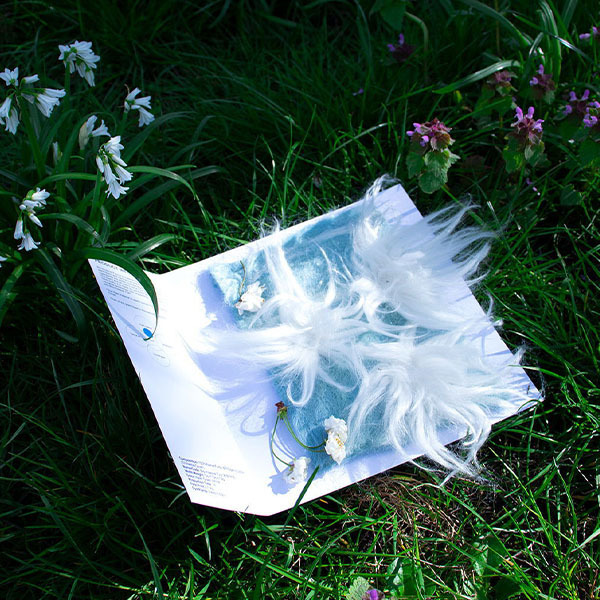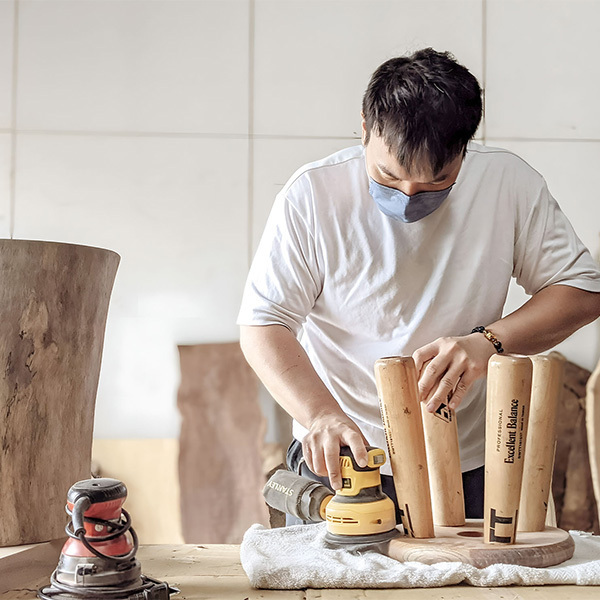Sea vegetable Circulation
合同会社シーベジタブル SEA VEGETABLE COMPANY
Eleonora Ortolani
Our ever-increasing mountain of plastic waste is an insurmountable problem.
Plastic production is not decreasing and the current system of recycling is failing to keep up.
Guilty Flavours is a radical proposal for how humans can harness our own bodies as machines to eliminate plastic forever – by eating it. New biochemical processes like digestion enzymes could allow humans to safely consume plastic. Starting with vanillin, the molecule of vanilla flavour, my research explores how we can realistically harness this process to create fully edible molecules transformed by living organisms.
<機械翻訳>
増え続けるプラスチック廃棄物の山は、克服できない問題である。
プラスチックの生産量は減少しておらず、現在のリサイクルシステムでは追いつかない。
ギルティフレーバー』は、人間が自らの体を機械として利用し、プラスチックを食べることで永遠にプラスチックをなくすことができるという、急進的な提案である。消化酵素のような新しい生化学的プロセスによって、人間はプラスチックを安全に消費することができる。私の研究は、バニラフレーバーの分子であるバニリンから始まり、このプロセスを現実的に利用し、生物によって変換された完全に食べられる分子を作り出す方法を探求している。
Guilty Flavours started as a radical response to a personal frustration around plastic waste recycling. Plastic production is not decreasing, and the recycling system around it cannot keep up, with only a very small percentage of plastic waste actually ending up in a plastic recycling facility. Banning single use plastic still feels like a far, utopian possibility. All of us own an incredibly powerful machine that can make things disappear: our body. Can we use it as a medium to transform plastic waste, and make it disappear for good?
Over time, multiple microorganisms have adapted to the plastic abundance as a new part of their natural environment, especially as their traditional sources of food become scarce. So why have we, as humans, still not thought that way?
The ice cream exhibited is the first real sample of food ever made containing an ingredient transformed from plastic waste: in detail, 20mg of PET plastic were used to flavour the ice cream.
The ice cream is displayed in a locked freezer because, despite its reality in the present time, it still needs to be tested for food safety. This highlights the ethically-controversial nature of evaluating the plastic-derived ingredient: in fact, despite its chemical similarity to the vanillin we already consume, whether natural or synthetic, the testing process is still considering this as a completely new ingredient and a new technology. This underscores the urgency for finding innovative solutions and rapid change in our society and politics of the food system to address pressing environmental issues.
Therefore, the ice cream will be locked and frozen until we, as humans, will make a decision on what to do with it. This is real and ready now, but are we?
This project has garnered global attention, transcending the confines of the art world and igniting conversations that extend far beyond traditional artistic spheres. It has successfully engaged audiences worldwide, capturing their attention and sparking discussions on a wide scale about microplastics, future of food, food politics and waste management.
<機械翻訳>
ギルティフレーバーは、プラスチック廃棄物のリサイクルをめぐる個人的なフラストレーションに対する過激な反応として始まった。プラスチックの生産量は減るどころか、リサイクルのシステムも追いつかず、実際にプラスチックのリサイクル施設に入るプラスチック廃棄物はごく一部に過ぎない。使い捨てプラスチックの禁止は、まだ遠いユートピアの可能性のように感じられる。私たちは皆、自分の体という、ものを消滅させることができる信じられないほど強力な機械を所有している。私たちはそれを媒体としてプラスチック廃棄物を変化させ、永久に消滅させることができるのだろうか?
多くの微生物は、特に従来の食料源が不足するにつれて、プラスチックという新たな自然環境に適応してきた。では、なぜ私たち人類はそのように考えなかったのだろうか?
展示されたアイスクリームは、プラスチック廃棄物から変換された成分を含む、これまでに作られた最初の実際の食品サンプルである。詳細には、アイスクリームの風味付けに20mgのPETプラスチックが使用された。
アイスクリームが鍵のかかった冷凍庫に陳列されているのは、現在の現実にもかかわらず、食品の安全性をテストする必要があるからだ。実際、天然であれ合成であれ、私たちがすでに摂取しているバニリンと化学的に類似しているにもかかわらず、試験工程ではまったく新しい成分、新しい技術とみなされている。このことは、喫緊の環境問題に対処するためには、革新的な解決策を見出し、私たちの社会とフードシステムの政治に急速な変化をもたらすことが急務であることを強調している。
したがって、アイスクリームは、私たち人間がそれをどうするか決断するまで、ロックされ冷凍されることになる。これは現実であり、今準備ができている。
このプロジェクトは世界的な注目を集め、アート界の枠を超え、伝統的な芸術領域をはるかに超えた会話に火をつけた。世界中の観客を巻き込み、注目を集め、マイクロプラスチック、食の未来、食の政治、廃棄物管理について幅広いスケールで議論を巻き起こすことに成功した。
Singularity University 学部議長、Community and Impact部門 元部長
We live on the cusp of using biotechnology to rebuild and redesign our world. While this holds great promise for solving environmental and social challenges, it also raises new questions. What is natural and unnatural? What is biological and what is material? What is healthy and unhealthy? What are the consequences of changing things? What are the consequences of not changing things? How much risk should we take? How much risk should we ask others to take? How do we not fear a future very different than our past? This project gently introduced these questions to the viewer. While much of the world engages in polarizing and destructive debate around technology and ethics, this project shows there is another way. We can experience and see possibilities for change and our future, while also remaining completely safe. I hope Eleanora will create other projects at the intersection of technology and ethics that allows more people to gently and safely explore the choices of our future.
私たちは今、バイオテクノロジーを使って世界を再構築し、再設計しようとしています。このことは、環境や社会的課題の解決に大きな期待を抱かせる一方で、新たな疑問も投げかけます。何が自然で何が不自然なのか?何が生物的で何が物質的なのか?何が健康で何が不健康なのか?物事を変えることの結果とは?変えないことの結果は?私たちはどれくらいのリスクを負うべきか?どの程度のリスクを他人に求めるべきか?過去とはまったく異なる未来を恐れないためには?このプロジェクトは、このような問いを私たちに優しく投げかけるものでした。世界の多くがテクノロジーと倫理をめぐる対立的で破壊的な議論に明け暮れている中、このプロジェクトは別の道があることを示しています。完全に安全でありながら、変化と未来への可能性を体験し、見ることは可能なのです。Eleanoraさんには、テクノロジーと倫理の交差点で、より多くの人々が優しく安全に私たちの未来の選択を探求できるようなプロジェクトを他にも生み出してほしいと願っています。
株式会社大阪鉛錫精錬所 代表取締役社長
A speculative art project that makes us have a good hard stare through the looking glass, this projects also has parallels with purifying sewage water for drinking, an unsavory but soon to become reality. To many, the concept itself (our waste as our nutrition) may be distasteful, but as a society, we have to admit that microplastics are already appearing in our food-chain and in our bodies.
The historical, socio-political and biotechnological aspects of the vanilla bean makes the choice of vanillin very appropriate, given the themes raised, "natural : artificial" intertwined with “mass produced : scarcely sourced”. The ubiquitous presence of vanillin has rendered the rare vanilla (bean-derived) to mean bland, common, basic. The petrochemically-derived vanillin as "vanilla" replaced the precious vanilla bean resulting in mass-consumption of vanilla aroma and flavours. Now people are trying to make biotechnological super-beans to make vanillin to swap out the petrochemicals.
If the PET-generated vanillin were super rare, only made in small quantities, will it have the preciousness of the original vanilla bean, even if the origins can be traced to petrochemicals? Or do we industrialize this process to produce the vanillin that has made the once precious vanilla, a common ingredient in our sweets? The fact that PET-derived vanillin can be industrialized raises philosophical questions and eybrows. Why does society always want to produce so much? To what extent do we want to pursue pleasures so that they become banal?
鏡の中の自分を見つめ、目をそらすなと言われているようなスペキュラティブアートです。下水を浄化して飲む(避けられない不快な現実)ような感触もあります。多くの人にとって、そのコンセプト(私たちの廃棄物が私たちの栄養となる)自体が不愉快かもしれませんが、社会としては、マイクロプラスチックがすでに食物連鎖や私たちの体内に存在していることを認めざるを得ません。
バニラビーンズの歴史的、社会政治的、バイオテクノロジー的な側面は、「天然 vs. 人工」と「大量生産 vs. 希少資源」というテーマが絡み合っていることを考えると、バニリンという素材の選択は非常に適切なものです。もともと希少だったバニラ(豆由来)は、今やどこにでもあるバニリンによって、「特徴のない、一般的な、基本的な」を意味するようになりました。石油化学由来のバニリンが「バニラ」として貴重なバニラビーンズに取って代わった結果、バニラの香りと風味が大量消費されるようになったのです。今、人々は石油化学製品に代わるバニリンを作るために、バイオテクノロジーを駆使してスーパービーンズを作ろうとしています。
PETから作られたバニリンが超希少で少量しか作られないとしたら、それが石油化学製品から生まれたとしても、バニラビーンズが持っていた尊さを帯びるようになるのでしょうか?それとも、貴重なバニラを身近なお菓子にも使える代替品で置き換えたように、このプロセスでバニリンを大量生産するようになるのでしょうか?PET由来のバニリンが工業化できるという事実は、哲学的な疑問を投げかけ、不快感を抱かせます。なぜ社会はいつもそんなに生産したがるのか?私たちはどこまで快楽を追い求め、それを陳腐化してしまうでしょうか?
建築家 / 成瀬・猪熊建築設計事務所 共同主宰
処理しきれないプラスチックゴミという現実から目を離すな、という強烈なメッセージを訴えてくるプロジェクトです。私たち人間自身がプラスチックを食べたらどうだ、それくらいしなければ現状は打破できないのでは、と。プロトタイプのアイスクリームが問題を全て解決することはできなくても、私たちの思考を広げ、深度化するには十分な力があります。プラスチックのリサイクルやそもそも使用量を抑えることなど、どれも大切だが、視点を変えてこの問題を見ることの大切さを教えてくれるプロジェクトです。
FabCafe Barcelona CEO
Guilty Flavours presents a revolutionary and experimental concept that reimagines the plastic waste problem through a radical yet intriguing lens. The project's vision of harnessing biochemical processes to convert plastic into edible substances is not just a creative endeavor but also a pragmatic solution to the global crisis of plastic pollution and a fundamental alteration of our relationship with plastic. The project has the potential to foster a new trend in research where we explore if we can transform what we previously considered harmful into new feasible solutions
Guilty Flavoursプロジェクトは、プラスチック廃棄物問題を過激で魅力的なレンズを通して再構築する、革命的かつ実験的なコンセプトを提示します。生化学的プロセスを利用してプラスチックを食用物質に変えるというこのプロジェクトのビジョンは、単に創造的な試みというだけでなく、プラスチック汚染という世界的な危機に対する現実的な解決策であり、プラスチックと私たちの関係を根本的に変えるものでもあります。このプロジェクトは、これまで有害だと考えられていたものを、実現可能な新たな解決策に変えることができるかどうかを探るという、研究の新たな潮流を育む可能性を秘めています。
MATR
MATR
TATAMI ReFAB PROJECT
HONOKA
Dodola
Pjorkkala
re:Mix, the circular kitchen mixer for your own glass jars
Open Funk
CirculaRElectronics by VERTMONDE
VERTMONDE ECUADOR
MateRe-DPP
株式会社digglue / digglue. inc
Transparent Solar Windows
VP for Ubiquitous Energy
プロジェクト「TSUMUGI」
一般社団法人アップサイクル General Incorporated Association Upcycle
The Mother Reef
Oyster Heaven
Anam PALF® by Ananas Anam
Ananas Anam
DiFOLD Origami Bottle
DiFOLD
Co-producing value-added, biodegradable plastics and additives from agricultural byproducts
Ourobio
Infinity Toy Box
Infinity Toy Box
Lichens as an bioindicators of "Well-being"
Yixuan Wang (collaborated with Julio Obscura)
Tejiendo la calle
Tejiendo la calle
comvey シェアバッグ®︎
株式会社comvey 代表取締役 / Comvey. Inc. CEO
“捨てないくらし”をかなえる。「くらしのサス活 Circular Action」
株式会社ECOMMIT ブランド戦略部 広報ブランディンググループ 所属
Hair Recycle
Dung Dung asbl
Lalaloop Reusable cup system for a circular city
OysterAble co., ltd.

Bio-invasive Textile Library
Bio-invasive Lab Ltd/ Central Saint Martin-Ma Biodesign
MateRe
株式会社digglue / digglue inc.
Briiv Air Filter
Five Create Ltd.
Gravity Wave - Plastic Free Oceans
GRAVITY WAVE
Seaweed Dialogues
Alberte Holmø Bojesen
記憶のえんぴつ
obake
